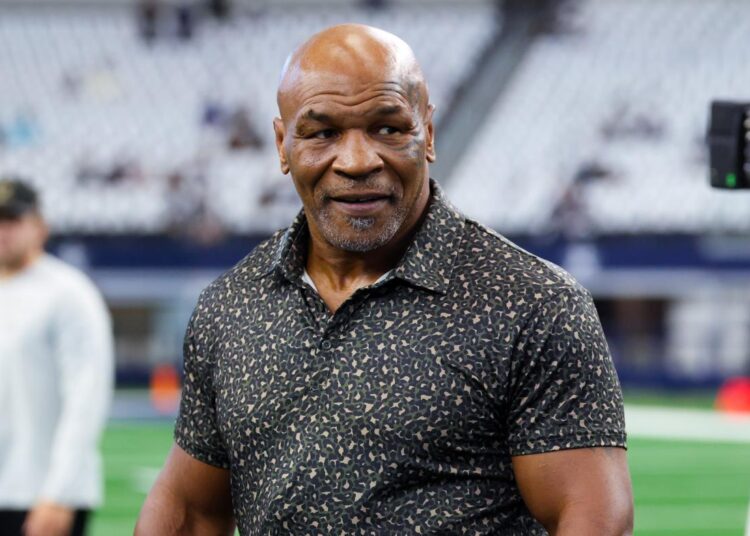Body language experts say there was more than meets the untrained eye Sunday when Mike Tyson and Jake Paul faced off at AT&T Stadium, home of the Dallas Cowboys and site of their scheduled fight Nov. 15.
At the request of USA TODAY, six body language experts reviewed video of what took place when Tyson, 58, and Paul, 27, met at midfield and elsewhere inside the football stadium before the Cowboys lost to the New Orleans Saints.
A handshake drew special attention.
Initiated by Paul, the handshake took place after the men stared each other down at midfield for about 12 seconds.
Lillian Glass, a body language expert who also focuses on interpersonal communication, noted of Paul, “He’s the first one to reach out to shake hands, which is kind of a power move.’’
The move went beyond Paul extending his right hand, according to Greg Williams, who has studied how body language can effect negotiation outcomes.
“Paul turns Tyson’s hand over,” Williams said. “That’s to say Paul’s hand is on top momentarily. That is a sign of dominance.”
In turn, Tyson covered Paul’s right hand with his left hand and double tapped.
“Which is to say, no, I’m on top,” Williams explained.
Tyson’s move extended beyond that, said Tonya Reiman, a body language expert who serves as a consultant and corporate trainer.
“He slaps (Paul’s) hand, which is a sign of, yeah, I’m the dominant individual in this situation, and he walks away first,’’ Reiman said. “So when you see that, that’s a complete sign of disrespect. I don’t think that (Tyson) does this to put on an act.’’
Same handshake, different views
Not all body language experts had the same interpretation of the handshake that lasted slightly more than one second.
“What strikes me most is that Tyson repeatedly appears almost as a supportive ‘master of the sport,’ who is giving Paul, the relative novice, a helping hand,’’ Mark Edgar Stephens, a body language expert who does coaching and consulting, told USA TODAY in an email. “This shows up in a literal way with the handshake.
“Sometimes cupping one hand over another in a handshake can be a way of dominating the other person, if the gesture is assertive. However, Tyson uses the gesture in a more nurturing way. He provides a caring, ‘sheltering’ of Paul’s hand during the handshake. It is actually a pleasure to see a seasoned fighter, known to be one of the toughest in the world, appearing with such a sense of self-awareness and support for his younger, less-experienced opponent.’’
Traci Brown, a body language expert who works on investigations and sales forensics, noted Tyson’s facial expression.
“Whenever you shake hands and cover the back of their hand too, it’s because of wanting to create a deeper connection,’’ Brown said by email. “Additionally, Tyson was smiling with his eyes during his approach and his mouth showed a very slight smile as well so the typical intimidation these types of meetings are created to do wasn’t happening.”
Friends or foes on fight night?
Williams pointed out that Tyson wasn’t blinking during the video clips.
“Normal people blink about 15 to 20 times a minute,” Williams said. “I did not detect Mike Tyson’s blinking at all, which is a sign of intimidation. That’s a silent body language move of trying to intimidate someone because you’re staring that person down, as it were.”
During another face-off, this time in the stands, Paul reached out to shake Tyson’s hand. Tyson looked at Paul’s right hand and stepped away.
“Paul was taking a step back away from Tyson as he was extending his hand,” Williams said. “It’s not necessarily normal to extend your hand and take a step back at the same time. And Paul is doing that. What does that indicate?
“I’d like to see literally another three seconds of that video.”
The video ends too abrupty to know if the men eventually shook hands.
Yet when they’re together on the field, Paul sprayed Tyson with deodorant and a smile crept onto Tyson’s face.
“My opinion is that this is a mentorship relationship,’’ Brown said. “My guess is that Tyson won’t hold back but also won’t go down easily.”
Williams said the term “frenemies” came to mind as he watched video clips of the boxers.
“That’s to say, friends that are projecting the atmosphere of being enemies simply because they know they have to ham it up for the camera,” Williams said. “I could see these two guys literally going and having a beer after the fight.”
So will Tyson be able to access the violent impulses that made him one of the most feared boxers ever? Can Paul go all out against a man he affectionately refers to as “Uncle Mike”?
“I always say the organism does what made the organism successful,’’ said Gregory Hartley, a body language expert and former Army interrogator. ”And I don’t always mean healthy. Sometimes it’s unhealthy too.
“What (Tyson) does is just pure instinct. And when I say instinct, it really is just repetition, repetition, repetition. They’re going to have the ability to turn that instinct on when the time comes.’’
Stephens suggested it could be trickier.
“How do two warriors who respect and like one another do battle?’’ he said. “From Roman gladiators to modern-day Olympians, the sense of admiration and affectionate respect has always squared off against the baser desire to conquer and win against our opponents. If/when this moment arrives in the fighting ring between Mike Tyson and Jake Paul, the struggle of that internal fight and its resulting outcome could prove as interesting as the external boxing match itself.’’
Follow Josh Peter on social media @joshlpeter11
This article originally appeared on USA TODAY: Mike Tyson, Jake Paul scrutinized by body language experts
Read the full article here


























